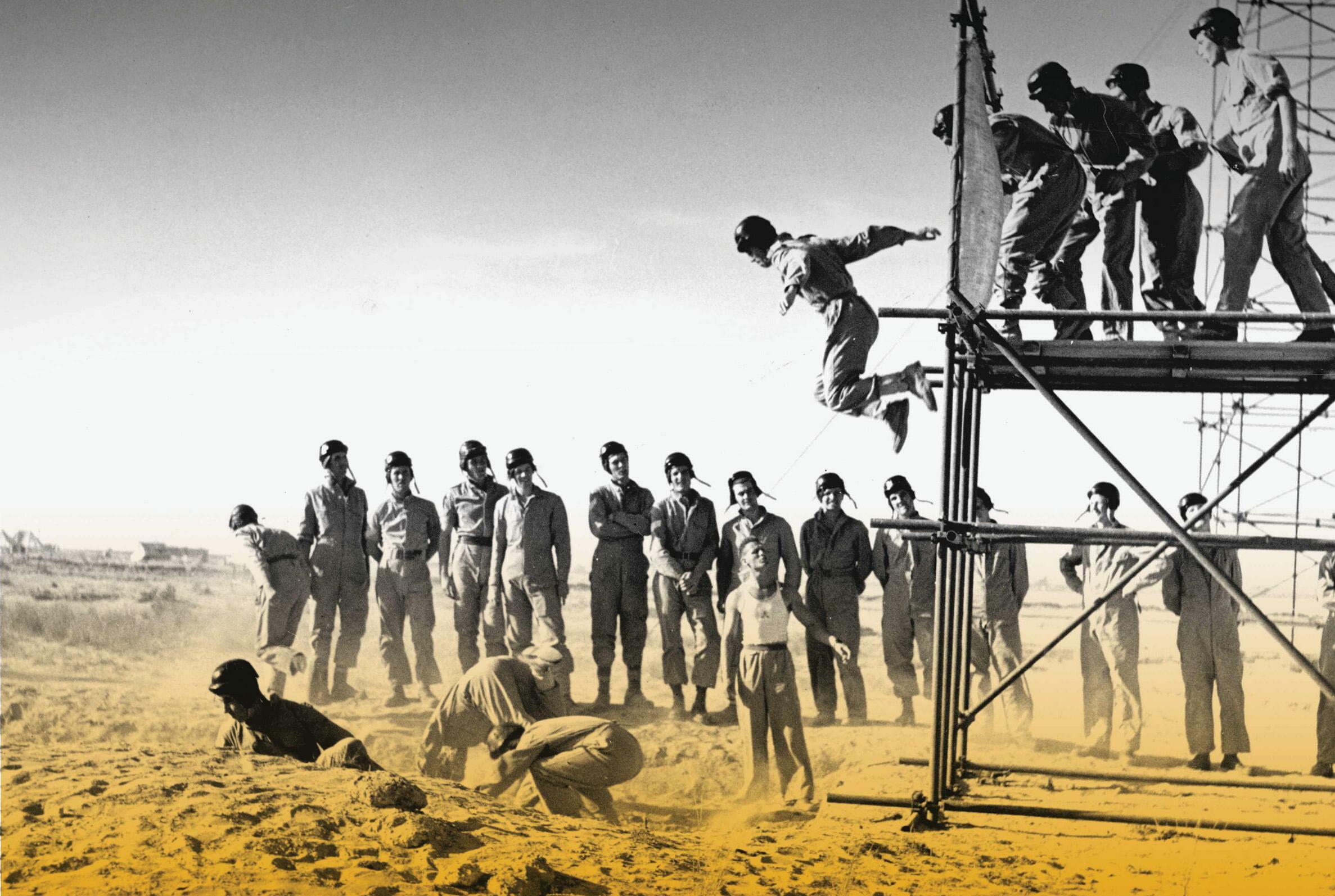THE ORIGINAL ROGUE HEROES
BBC History UK
|July 2023
It's a story of extravagant lies, homemade bombs and adrenaline-pumped commandos. Joshua Levine charts the formative years of the SAS through the exploits of four extraordinary servicemen

1 Fake news in fancy dress
How MICK GURMIN became a member of the SAS before it even existed
In 1941, a young British trooper based in Palestine was sent on an unlikely mission. Together with a fellow soldier named Smith, Mick Gurmin was dispatched to Cairo with instructions to spread an elaborate yarn around restaurants, bars and tourist hotspots. For the mission, Gurmin was issued with a uniform liberally sewn with parachute badges, to back up his membership of the 1st Special Air Service (SAS) Battalion parachute unit, which was completing its training in Transjordan. It was an intriguing costume – because the 1st SAS didn’t exist.

Both battalion and uniform were inventions of Lieutenant Colonel Dudley Clarke. He had recently arrived in the region, having been summoned by his friend and supporter Sir Archibald Wavell, British commander-in- chief for the Middle East. Clarke’s task was to deceive the enemy about British intentions – and the capture of an Italian officer had presented him with an opportunity. The officer’s diary revealed an Axis belief that British parachute troops were present in the Middle East. In truth, there were none – but Clarke spotted the chance to exploit an existing fear. He schemed a plot to convince enemy intelligence that 500 parachutists, all specialists in vehicle sabotage, had arrived in the region. This deception operation was codenamed ‘Abeam’, and Gurmin’s carefully staged performance was a key element.
Bu hikaye BBC History UK dergisinin July 2023 baskısından alınmıştır.
Binlerce özenle seçilmiş premium hikayeye ve 9.000'den fazla dergi ve gazeteye erişmek için Magzter GOLD'a abone olun.
Zaten abone misiniz? Oturum aç
BBC History UK'den DAHA FAZLA HİKAYE

BBC History UK
On the skids
Richard Rodgers and Oscar Hammerstein II's smash musical Oklahoma! opened on Broadway on 31 March 1943.
1 min
Christmas 2025

BBC History UK
Small pleasures
Memory is imperfect, but what if you could get a professional model maker to recreate a moment from the past?
1 min
Christmas 2025

BBC History UK
Bath in five places
In the Georgian era, Bath became arguably Britain's most fashionable destination. KIRSTEN ELLIOTT promenades five historic highlights
3 mins
Christmas 2025

BBC History UK
End times
Why do civilisations that dominated their epoch fail? In an era of autocracy, climate change, the rise of Al and a first-hand understanding of how deadly pandemics can be, it's a question that seems pertinent.
1 min
Christmas 2025

BBC History UK
What are the origins of the Yule Lads?
To learn about the Jólasveinar (Yule Lads), we must start with their mother, the terrifying ogress Grýla. Her name appeared in Icelandic texts as early as the 13th century, although it wasn’t until later that those 13 mischievous lads became associated with her. Folk tales and poems tell how she descends from the mountains with an empty sack to stuff full of children. Grýla owns the monstrous Jólaköttur (Yule Cat), which roams the countryside on Christmas Eve, searching for children to gobble up if they're not wearing new clothes.
1 mins
Christmas 2025

BBC History UK
Santa Claus v Father Christmas
The true identity of the white-bearded, red-robed figure who fills children's stockings at Christmas has long been debated. Thomas Ruys Smith sizes up the merry contenders
8 mins
Christmas 2025

BBC History UK
Frontier friction
Set in Washington Territory in 1854, The Abandons is a Western that's unusual for having two matriarchs, women whose lives become entangled, at its centre.
1 min
Christmas 2025

BBC History UK
The Last Days of Pompeii: The Immersive Experience
Delve into the culture of daily Roman life, witness the momentous eruption of Mount Vesuvius, and follow its fallout in Immerse LDN's new exhibition. In a blend of cutting-edge technology and vivid storytelling, this exhibition launches visitors into Pompeii's rich history with recreations of the ancient city's beautiful pre-eruption landscape, a 360-degree virtual reality Roman amphitheatre experience, and a digital metaverse recreating Pompeii's 'Villa of Mysteries'.
1 min
Christmas 2025

BBC History UK
Elizabeth Marsh The corsair's captive
Taken hostage by a Barbary ship's captain in the 18th century, a young Englishwoman found herself fighting for her freedom in Marrakech. ADAM NICHOLS introduces a brave captive who later wrote a book about her dramatic experiences
6 mins
Christmas 2025

BBC History UK
29 DECEMBER 1170: Thomas Becket is murdered in Canterbury
Knights loyal to Henry II rid him of the “low-born cleric”
2 mins
Christmas 2025
Translate
Change font size

